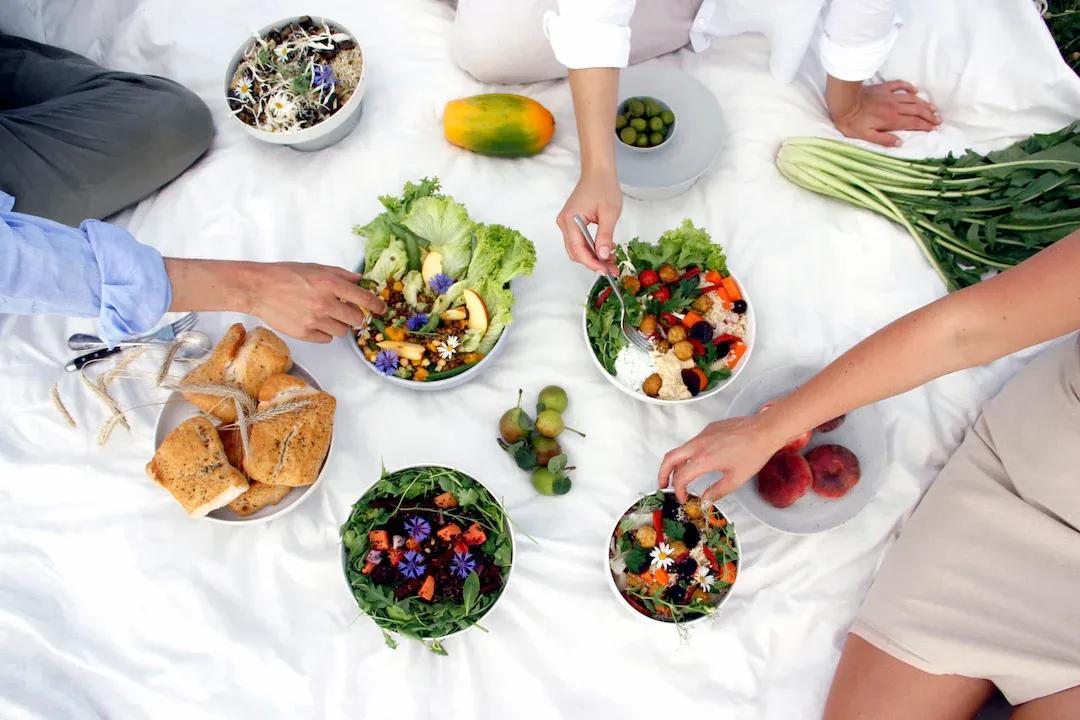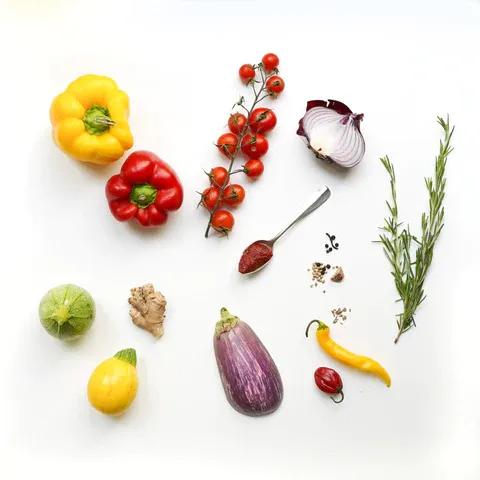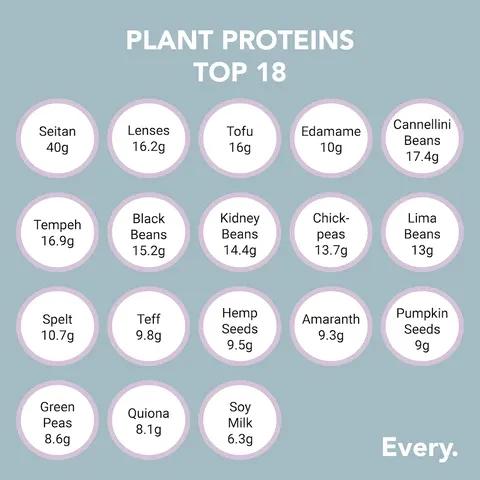Vegan Protein Sources – The Key Facts
Can you have a protein-rich diet if you're vegan? Can you build muscle on a plant-based diet? What's the difference between animal vs. plant-based protein? Read to find out everything you need to know!

A protein rich vegan diet? That’s a challenge. You want to build muscle and you're vegan? Forget it. These are some of the typical prejudices and myths that surround the topic of protein in a vegan diet. Most people who are vegan have probably heard one or the other misinformed claim, and now believe to be nutritional experts, ready to give you unsolicited advice whenever you sit down for a meal. To help you navigate these often annoying conversations, we’ll equip you with the right information to help you swat away questions and make you the real expert on vegan protein.
If you want to read more about a vegan diet in general, find a dedicated article on that topic here.
Contents of this article:
- What is protein?
- Can you lose weight with plant-based protein?
- Can you build muscle if you're vegan?
- Animal vs. Plant-based protein: what's the difference?
- What are the best plant-based protein sources?
- What about protein in Every. meals?
- How much protein should you eat per day?
What is protein?
‘Protein’ originates from the Greek word ‘Proton’, which roughly means ‘first’. This is suitable, because proteins are incredibly important for the human body. Proteins provide our muscles, organ and blood–as well as hormones and enzymes–with important nutrients.
Protein, carbohydrates and fats make up the three macronutrients, essential for bodily functions. Proteins consist of amino acids which are essential building blocks for our metabolism and to facilitate muscle building. Non essential amino acids can be produced by the body itself, whereas essential amino acids need to be supplemented from external sources (e.g. food). Of the total 20 amino acids in our body, 9 of them are essential, and therefore need to be supplied through animal products that contain these amino acids.
So does that mean that animal products have to be part of our diet? No, it doesn’t. Nevertheless, the myth that a vegan diet results in insufficient protein consumption, is probably the most notorious and well-circulated. This, however, is misinformed. There are a variety of vegan ingredients that contain an impressive amount of protein. Nuts or some legumes, for example, will easily cover your daily recommended intake of about 0.8g (according to the DGE and depending on your height, weight and activity level). Did you know that the protein content of kidney beans is 24g per 100g? That’s more protein than Pork! So, plant based protein is definitely a thing.

Can you lose weight with plant-based protein?
Theoretically, you can lose weight while following any diet, unless your diet only consists of chocolate, pizza and chips. The critical aspect is the calorie deficit: you need to be burning more calories than you are consuming. This difference should be somewhere between 300-500 calories. A vegan diet has a distinct advantage over other diets when it comes to weight loss. Individuals who eat egan, tend to have a well balanced diet, due to their selection of a diverse range of foods like vegetables, legumes, seeds, fruit and plant oils. Not only does this taste great, it also nourishes the body. Want to know more about what a well-balanced diet is or looks like? Read more about it here.
Anyone who is interested in losing weight, and wants to do so while eating vegan, should make sure that all essential nutrients, minerals and trace elements are being supplied. That includes Vitamin B, Vitamin D, Iron, Zinc, Calcium, and Omega-3 and Omega-6 fatty acids.
Can you build muscle if you're vegan?
Yes, you can and effectively! As previously mentioned, protein is the main macronutrient necessary to enable muscle building. Whether your source is animal or plant based protein, your body doesn’t mind. There is no difference in quality or efficacy. The important thing is just the amounts of protein that you supply your body with. In contrast to weight loss where the focus is on a calorie deficit, muscle building requires a calorie surplus, with which to increase muscle mass.
If you’re trying to build muscle, you should eat about 1.6-2.2g of protein per kg of body weight. Generally, you should aim to increase your calorie intake by 250-500 calories more than your average pre muscle building diet.
Legumes are an excellent source of protein. Lentils, peas, soybeans, nuts, vegetables (broccoli, kale and cress), rice, oats, as well as wholegrain foods and seitan, these foods contain gluten protein. To cover your daily protein needs from plant based sources, a diverse diet and colourful combinations are essential. You’ll find a huge amount of delicious vegan recipes on the internet or in the Every. Magazine. How about a Naked Taco recipe or a creamy peanut udon noodle soup?
Animal vs. Plant protein: What's the difference?
Ever heard of biological value? No problem, we'll explain it to you: Every protein-containing food (whether vegetable or animal) consists of a certain composition of amino acids, the more similar these are to the human body, the higher the "biological value".
In general, you need fewer foods with a high biological value to cover your daily protein requirements. For example, a whole egg has a biological value of 100 and is therefore well absorbed by your body - but why? In earlier studies, it was assumed that chicken protein is most similar to human protein, i.e. it has a very similar composition of amino acids. If a protein-containing food is less well absorbed by your body, it will have a biological value of less than 100. It’s no secret that animal foods have a higher biological value than plant foods. Logically, we are evolutionarily closer to a chicken than we are to a pea.
Do vegans have to go back to eating steak after all? No. Because we must not forget that animal products from factory farming have a greatly reduced biological value. And it also depends on the right combination of foods: The biological value of quinoa is at 73, that of rice can be at 83 (depending on the type) and that of soy is at an impressive 96! And lest we forget, even our beloved Every. Bowls have been expertly crafted and well portioned to enable balanced diet and cover your daily needs. Click here to add some delicacies like Tikka Masala, Happy Quinoa or Naked Taco to your basket.
What are the best plant-based protein sources?
An overview of some of the best plant-based protein sources:
1. Grains and Pseudo-grains
- Long-grain rice, white 2,7 g Protein per 100 g
- Amaranth 15,9 g Protein per 100 g
- Spelt 15 g Protein per 100 g
- Quinoa 14,8 g Protein per 100 g
- Oats 13,5 g Protein per 100 g
- Millet 10,6 g Protein per 100 g
- Whole grains 13 g Protein per 100 g
2. Legumes
- Soy 11,9 g Protein per 100 g
- Kidney beans 24 g Protein per 100 g
- Chickpeas 19 g Protein per 100 g
- Lentils 9 g Protein per 100 g
- Peas 5 g Protein per 100 g
- Lupine 43 g Protein per 100 g
3. Nuts
- Cashews 18 g Protein per 100 g
- Peanuts 26 g Protein per 100 g
- Almonds 24 g Protein per 100 g
- Hazelnuts 15 g Protein per 100 g
4. Vegetables
- Kale 4,3 g Protein per 100 g
- Broccoli 2,8 g Protein per 100 g
- Cress 2,6 g Protein per 100 g
- Mangold 1,8 g Protein pro 100 g
- Lettuce 1,8 g Protein per 100 g
- Spinach 2,9 g Protein per 100 g
5. Seeds
- Pumpkin seeds 19 g Protein per 100 g
- Pumpkin seeds, dried 30 g Protein per 100 g
- Hemp seeds 31 g Protein per 100 g
- Lin seeds 18 g Protein per 100 g
- Sesame 18 g Protein per 100 g

Ready-made vegan meat substitutes and vegan protein powders made from rice protein, pea protein or lupine protein also have a perfect amino acid profile, which makes them suitable protein sources - especially for muscle building. But as always, check the ingredients list, because unwanted and unnecessary additives could be lurking.
You’re unsure of what ingredients can be used for vegan meat alternatives? Read more about this in detail here.
What about protein in Every. meals?
A variety of our meals cover your daily recommended intake of protein. Just coming home from the gym and too tired to cook? Our Tikka Masala and Bami Goreng bowls are the perfect post workout meal, containing 23,4g and 26g of protein respectively as well as a great mixture of vegetables and carbohydrates. The perfect fast solution to still that post-workout craving. If you feel like something cosier, Golden Curry contains lots of chickpeas which are high in protein. If we haven’t hooked you yet, browse our entire collection here, and find your favourite in no time. We're also working constantly on expanding our product range, so stay tuned for lots of tasty new additions (high in protein too) in the coming months!
How much protein should you eat per day?
Do you want to track your protein intake? Then follow these steps–but proceed with caution, cause there are many factors that influence how much you need. Things like your age, gender, level of activity and end goal all play a role. Consulting a doctor or nutritionists can also always be beneficial. As a general rule of thumb, adults below the age of 65 of an average activity level, should consume about 0.8g of protein per kg of body weight. So at a weight of 56kg, your daily protein intake would be 44,8g.
In conclusion, people who are vegan have a wide array of plant based protein sources at their disposal. This selection also enables muscle building. Our body doesn’t care whether the protein it gets comes from plant or animal sources, the important thing is the right amounts and right combinations to supply our organs and muscles with all the nutrients they need for optimal function.
Other noteworthy articles:
- Vegan Meat Alternatives – Everything You Need to Know
- Healthy Breakfast – The Best Start to Your Day
- Healthy and Long-Term Weight Loss
- Superfoods – How 'Super' and How Healthy are They Really?
- Vegan Eating – Everything You Need to Know
For even more foodie-content follow us on Instagram and join the Facebook Community to get involved in meal creations and to stay up to date on all things Every.
